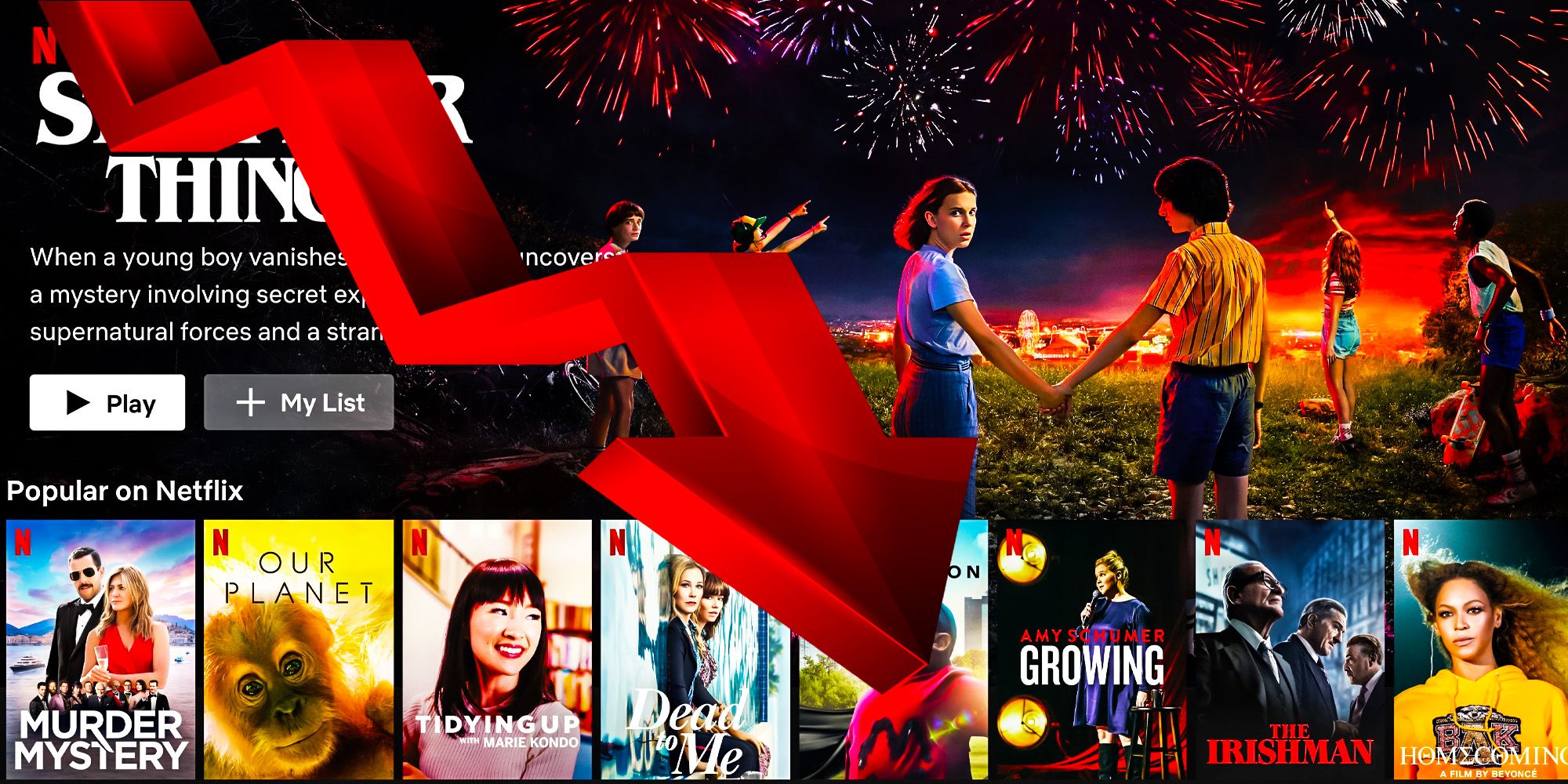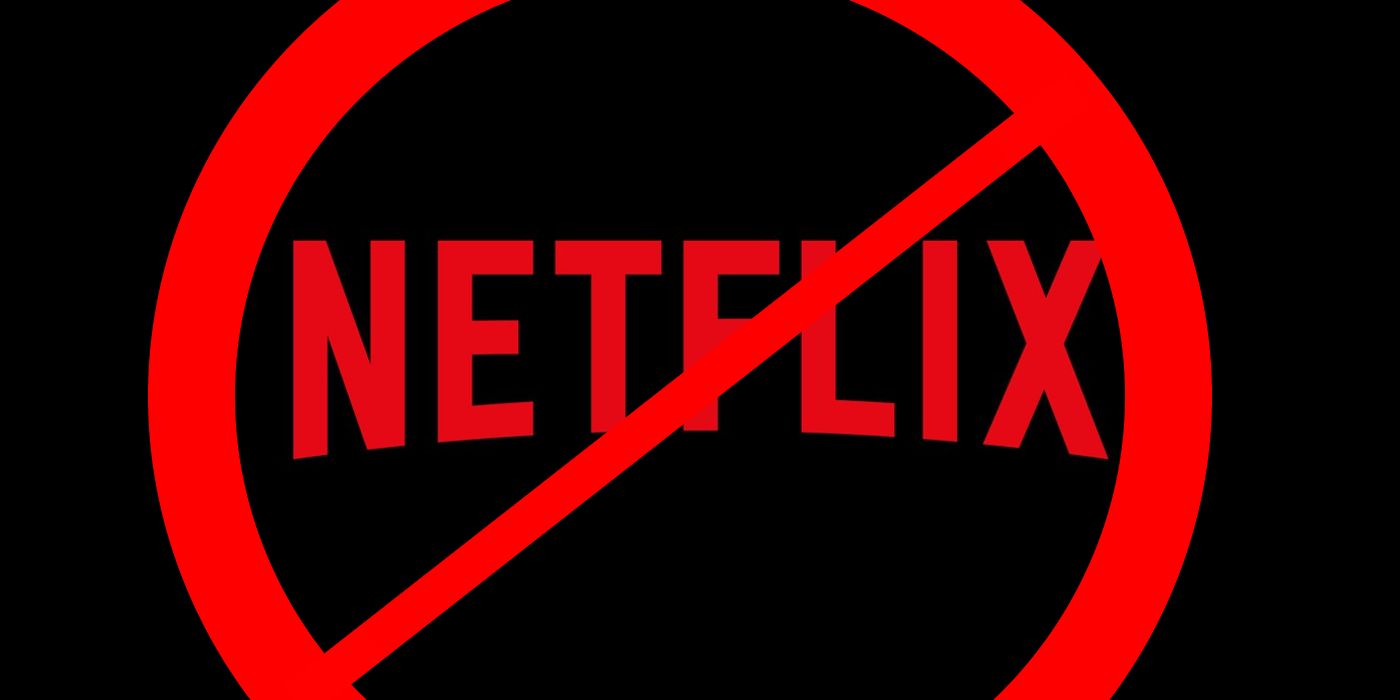After the recent reveal that Netflix is losing lots of subscribers, its stock price dropped significantly, and it's likely just the beginning of worse to come. Earlier this week, Netflix reported a net loss of subscribers, something that has rarely happened in the history of the service. While Netflix does lose subscribers regularly due to churn, it usually gains enough new subscribers to lead to a total increase. In this case, that didn't happen, with the first quarter of 2022 seeing Netflix lose 200,000 subscribers.
Following that news, Netflix stock plummeted, losing 35% of its value and costing the company an enormous amount of money. Making things worse is that Netflix expects to lose two million more subscribers in the second quarter of the year. By contrast, Netflix added nearly four million new subscribers to its rolls in the first quarter of 2021, marking a sharp downturn in only one year's time. If this pattern holds, the service that essentially invented subscription streaming is in for some choppy waters ahead.
Netflix's near future is starting to look a bit bleak, and while it would take something truly catastrophic to cause the service to shut down, it could definitely end up falling out of its clear top spot in the industry. The question now becomes whether or not Netflix can right its ship, preferably sooner rather than later. The streaming service certainly could save things, at least theoretically, but it'll take a lot of effort as it's already dug a pretty deep hole.
Why Netflix Is Losing Subscribers
When it comes to exactly why Netflix is losing subscribers, there are several reasons that make themselves apparent. The most obvious is that, content-wise, Netflix just isn't what it once was, despite an influx of Ryan Reynolds movies. For over a decade, Netflix served as a streaming hub of sorts, hosting content made by almost every major studio. Now, with most of those studios and networks and cable channels having formed their own streaming services in the last couple of years, Netflix finds itself forced to rely more and more on its own originals to draw subscribers. That's a harder push than being able to offer recent blockbuster movies and fan-favorite network shows.
Adding to that, if a subscriber becomes attached to a Netflix Original show, that show is often in danger of being canceled after just one or two seasons without any kind of plot resolution. In the past, Netflix tended to give its originals at least a few seasons to try and gain an audience, but now, if something doesn't become popular and generate more subscriptions right away, Netflix abandons it. On top of those factors, there's the issue of Netflix's increasingly outlandish subscription price increases. Less than a decade ago, Netflix was a very economical option for entertainment, charging only $7.99 per month for its base streaming plan. Since then, Netflix's value for money has steadily eroded via consistent price hikes, leading to the current base price of $15.49 a month, almost double the old $7.99 price tag that stayed put for a long time. Price increases are a reality of business, but six of them in eight years is significant.
Netflix Isn't Trying To Compete With Other Streaming Services
Another factor in Netflix's decline may well just be arrogance, bred from years of being the nearly undisputed king of subscription streaming services due to being first to market. While Amazon Prime and Hulu have tried to muscle in on Netflix's territory for a long time, the rise of Disney+, HBO Max, Paramount Plus, Peacock, and more have made the competition for consumer dollars a very crowded one. Yet, Netflix really doesn't seem to be making any big plays as an attempt to counteract all these new competitors. The company seems to think that holding the line is the prudent option, but after projecting the loss of millions of subscribers in 2022, perhaps that will change.
For now, Netflix seems perfectly happy being the most expensive streaming service, stealing HBO's crown in that dubious regard with its recent raise to $15.49. Netflix is also standing by its binging release format, and while that's a famous aspect of the service, nearly every other competitor is seeing their biggest successes with the one episode per week release model. Disney+ has especially maximized this with its Marvel Studios and Star Wars shows, as the weekly interval has resurrected the tradition of discussion and debate about what will happen next week. The Netflix binge model insists everyone watch the whole season at the same time to participate in the conversation, which many people just don't have the time to do, and leads to much longer gaps between seasons. Services like HBO Max and Peacock are also seeing success by offering a lower-priced, ad-supported option, similar to Hulu, something Netflix still chooses not to offer.
Can Netflix Recover Subscribers? What They Need To Do
The quickest thing Netflix could do to regain subscribers - outside of not canceling shows like The Order too soon - is to cut their price, but in the world of business, that's often a non-starter, especially for publicly traded companies. At the very least, though, Netflix could try and regain consumer loyalty by pledging not to increase their price again for at least five years, offering some peace of mind to the budget-conscious, especially in an era where a pandemic has wrecked the finances of many. They could also institute a cheaper, ad-supported tier, which reports suggest the company is already smartly considering. While ads on Netflix will be seen as sacrilege to some, a tier with ads would likely lead to increased subscriber counts and profits.
There have also been reports that Netflix is considering moving to a weekly release model for at least some of its original shows, which would likely do wonders for subscriber churn. Sure, one could just wait until all the episodes have been released, but by then they'll have been effectively locked out of the global conversation about the show. Sadly, this change won't come soon enough for Stranger Things' upcoming season 4, as one can only imagine the amount of weekly social media chatter a show that big could generate. The only thing Netflix really can't do anything about is the continued loss of content licensed from other creators, as that will likely continue to disappear as more and more deals struck prior to the creation of services like HBO Max and Paramount+ expire.




